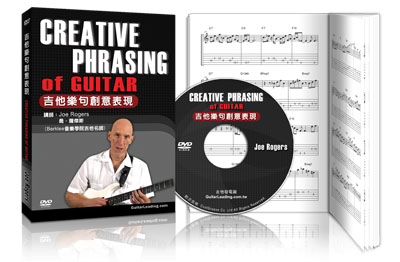
This 2008 DVD & Booklet set is an instructional video is by Berklee Assistant Professor, Joe Rogers produced by Guitar Leading/Cool Music Publishing.
Previously, I had the opportunity study with Joe at Berklee. I took one of his guitar labs, Linear Approach Techniques which was a useful class for me. In this DVD, you get quite a lot of similar material to what he covered in that Berklee lab!
This video covers a lot of things that can help you develop your technique, understand the fretboard better and also improve your hearing for improvisation & composition.
There are five chapters in the video:
- 2 Note Motifs
- 3 Note Motifs
- Introduction to Non-diatonic Chords
- Arpeggios
- Approach Patterns
The material in this video is very systematic. It reminds me of Les Wise’s Fretboard Freedom course from Truefire which I previously reviewed back in 2019. So much of the arpeggio chapter presents arpeggios in an organized manner that really helps you see it all across the fretboard on different string sets. Joe also gives practical ways to practice the material.
Joe’s teaching style is understated and kind of like how John Stowell speaks (although John talks more about his musical concepts, unlike Joe who explains the fingerings more).
Joe explains each concept before showing the fingering & finally demonstrating how he uses it over a backing track. A portion of the improvised solos is also transcribed in the booklet.
The 2 & 3 Note Motifs demonstrate how you can use different variations of simple scalar motifs to create stronger solos with good note choices & phrasing.
In the non-diatonic chords section, he explains how secondary dominants come in play and how you can start playing through chord changes.
In the arpeggios chapter, Joe goes through 15 different arpeggios types (both triads & 4-part chords) along with their inversions. He shows systematic fingerings that allow you to really master each sound.
Then, you learn how to embellish the arpeggios with approach patterns. This opens up your skills to not only play standard ascending or descending arpeggios but actually create lines that have more interest without thinking about scales or modes.
Closing the DVD, you get an Approach Workout section where you can play along & practice with Joe. This is a great way to learn what Joe has taught and simulates a classroom experience.
In conclusion, this video is a great resource for a guitarist who really wants a jazz gym kind of workout to learn to play over chord changes. This is the opposite of a licks-based approach to learning improvisation (for that, check out the Van Hemert System by Christiaan Van Hemert). If you’ve ever been curious how it’s like to take a Berklee guitar department guitar lab, this DVD gives a taste of what the experience is like, compressed into just over 90 minutes. For the right guitarist, this video can be a great way to improve your skills.
Pros: Well organized materials explained in logical way.
Cons: Material may feel theoretically dry. Some assembly required!
TLDR: If you want to navigate across the fretboard more confidently and hear better, this is a worthwhile video to get.
I’m not sure where you can purchase this online since I found it in at the Kinokuniya Bookstore at Takashimaya in Singapore (it was in the Chinese book section. You can find out more about this video here: https://www.ms333.com/China-pub/Cool/GT-CreativePhrase-JoeTW.htm
[Review Archive]
I wrote a lot of other book, course and video reviews too.
Check out the rest here:
[Read more reviews]
[Submissions for Review Consideration]
- Are you an author who wrote a jazz, guitar or music book?
- Have you created a DVD or an online video course or subscription based website?
- Would you like me to review your book/course?
Please send me a message at azsamad3 at gmail.com with:
For courses: a link to the course/video/product + access info etc.
For books: a link to the book (Dropbox) or PDF attachment (if it’s small) for review consideration.
Depending on whether I dig the book/course, I’ll let you know if I do plan to review it!
I cannot guarantee a review for every submission & if I’m not too into it, I may opt not to review it. I mean, it’s better to get a good review that for me to write a bad review just because it’s not a match for the kind of stuff I dig right? :p
NOTE: All reviews reflect my honest personal opinion so be aware that I will point out both cool Pros and Cons that I see in the work. You dig?
Leave a Reply